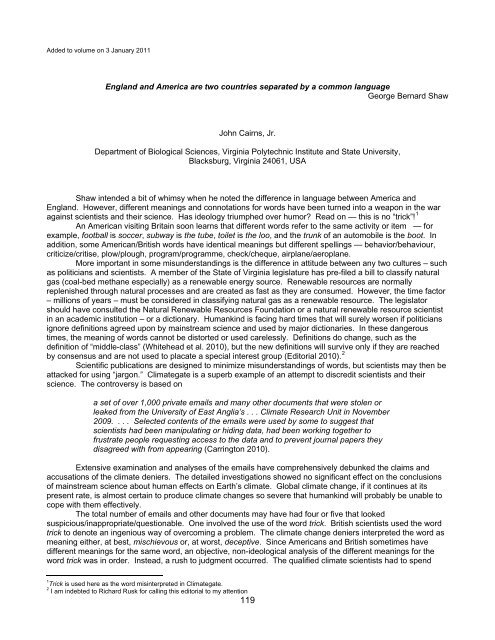England and America are Two Countries Separated by a Common ...
England and America are Two Countries Separated by a Common ...
England and America are Two Countries Separated by a Common ...
You also want an ePaper? Increase the reach of your titles
YUMPU automatically turns print PDFs into web optimized ePapers that Google loves.
Added to volume on 3 January 2011<br />
<strong>Engl<strong>and</strong></strong> <strong>and</strong> <strong>America</strong> <strong>are</strong> two countries separated <strong>by</strong> a common language<br />
George Bernard Shaw<br />
John Cairns, Jr.<br />
Department of Biological Sciences, Virginia Polytechnic Institute <strong>and</strong> State University,<br />
Blacksburg, Virginia 24061, USA<br />
Shaw intended a bit of whimsy when he noted the difference in language between <strong>America</strong> <strong>and</strong><br />
<strong>Engl<strong>and</strong></strong>. However, different meanings <strong>and</strong> connotations for words have been turned into a weapon in the war<br />
against scientists <strong>and</strong> their science. Has ideology triumphed over humor? Read on — this is no “trick”! 1<br />
An <strong>America</strong>n visiting Britain soon learns that different words refer to the same activity or item — for<br />
example, football is soccer, subway is the tube, toilet is the loo, <strong>and</strong> the trunk of an automobile is the boot. In<br />
addition, some <strong>America</strong>n/British words have identical meanings but different spellings — behavior/behaviour,<br />
criticize/critise, plow/plough, program/programme, check/cheque, airplane/aeroplane.<br />
More important in some misunderst<strong>and</strong>ings is the difference in attitude between any two cultures – such<br />
as politicians <strong>and</strong> scientists. A member of the State of Virginia legislature has pre-filed a bill to classify natural<br />
gas (coal-bed methane especially) as a renewable energy source. Renewable resources <strong>are</strong> normally<br />
replenished through natural processes <strong>and</strong> <strong>are</strong> created as fast as they <strong>are</strong> consumed. However, the time factor<br />
– millions of years – must be considered in classifying natural gas as a renewable resource. The legislator<br />
should have consulted the Natural Renewable Resources Foundation or a natural renewable resource scientist<br />
in an academic institution – or a dictionary. Humankind is facing hard times that will surely worsen if politicians<br />
ignore definitions agreed upon <strong>by</strong> mainstream science <strong>and</strong> used <strong>by</strong> major dictionaries. In these dangerous<br />
times, the meaning of words cannot be distorted or used c<strong>are</strong>lessly. Definitions do change, such as the<br />
definition of “middle-class” (Whitehead et al. 2010), but the new definitions will survive only if they <strong>are</strong> reached<br />
<strong>by</strong> consensus <strong>and</strong> <strong>are</strong> not used to placate a special interest group (Editorial 2010). 2<br />
Scientific publications <strong>are</strong> designed to minimize misunderst<strong>and</strong>ings of words, but scientists may then be<br />
attacked for using “jargon.” Climategate is a superb example of an attempt to discredit scientists <strong>and</strong> their<br />
science. The controversy is based on<br />
a set of over 1,000 private emails <strong>and</strong> many other documents that were stolen or<br />
leaked from the University of East Anglia’s . . . Climate Research Unit in November<br />
2009. . . . Selected contents of the emails were used <strong>by</strong> some to suggest that<br />
scientists had been manipulating or hiding data, had been working together to<br />
frustrate people requesting access to the data <strong>and</strong> to prevent journal papers they<br />
disagreed with from appearing (Carrington 2010).<br />
Extensive examination <strong>and</strong> analyses of the emails have comprehensively debunked the claims <strong>and</strong><br />
accusations of the climate deniers. The detailed investigations showed no significant effect on the conclusions<br />
of mainstream science about human effects on Earth’s climate. Global climate change, if it continues at its<br />
present rate, is almost certain to produce climate changes so severe that humankind will probably be unable to<br />
cope with them effectively.<br />
The total number of emails <strong>and</strong> other documents may have had four or five that looked<br />
suspicious/inappropriate/questionable. One involved the use of the word trick. British scientists used the word<br />
trick to denote an ingenious way of overcoming a problem. The climate change deniers interpreted the word as<br />
meaning either, at best, mischievous or, at worst, deceptive. Since <strong>America</strong>ns <strong>and</strong> British sometimes have<br />
different meanings for the same word, an objective, non-ideological analysis of the different meanings for the<br />
word trick was in order. Instead, a rush to judgment occurred. The qualified climate scientists had to spend<br />
1<br />
Trick is used here as the word misinterpreted in Climategate.<br />
2<br />
I am indebted to Richard Rusk for calling this editorial to my attention<br />
119
inordinate amounts of time responding to accusations that lacked robust supporting scientific evidence. Climate<br />
change scientists should be able to devote all their time <strong>and</strong> energy to gathering <strong>and</strong> analyzing evidence on this<br />
complex, multivariate problem, not explaining or justifying their word choices. In addition, climate scientists <strong>and</strong><br />
those in related fields of science should be aw<strong>are</strong> that their emails may be made public <strong>by</strong> illegal hackers <strong>and</strong><br />
should be as vigilant in these exchanges as they <strong>are</strong> in articles in peer-reviewed, scientific journals.<br />
Humankind cannot afford another “Climategate.” A preliminary assessment of the dangers of a now<br />
probable global surface mean temperature of 4°C <strong>and</strong> beyond has recently been published (Tyndall Centre<br />
2010). The dangers <strong>are</strong> many, <strong>and</strong> time to gather additional, relevant, scientific evidence is short. Above all,<br />
humankind should aspire to leave a habitable planet for future generations. The ideological attacks on scientists<br />
<strong>and</strong> their scientific research on global climate change <strong>are</strong> a major obstacle to achieving that compassionate<br />
goal!<br />
Acknowledgments. I am indebted to Darla Donald for transcribing the h<strong>and</strong>written draft <strong>and</strong> for editorial<br />
assistance in preparation for publication.<br />
LITERATURE CITED<br />
Carrington, D. 2010. Q&A: ‘Climategate.’ Guardian 7Jul<br />
http://www.guardian.co.uk/environment/2010/jul/07/climate-emails-question-answer.<br />
Editorial. 2010. Natural gas isn't renewable. Roanoke Times 29Dec<br />
http://www.roanoke.com/editorials/wb/272159.<br />
Tyndall° Centre. 2010. Four degrees <strong>and</strong> Beyond Special Issue Journal. 29Nov http://yubanet.com/scitech/Four-<br />
Degrees-<strong>and</strong>-Beyond-Special-Issue-<br />
Journal.php?utm_source=feedburner&utm_medium=feed&utmcampaign=Feed%3A+Yubanet+%28Yub<br />
aNet.com+Headlines%29.<br />
Whitehead, B. D., Wolfe, A., Taylor, P., Stevenson, B. 2010. So you think you're middle class? New York<br />
Times 22Dec http://www.nytimes.com/roomfordebate/2010/12/22/what-does-middle-class-mean-today.<br />
120















